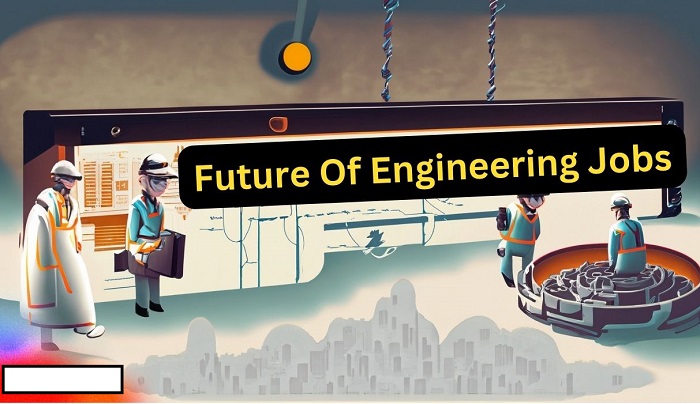
The future of engineering jobs is likely to be shaped by several key factors:
- Technological Advancements: With the rapid advancement of technology, there will be an increasing demand for engineers who specialize in emerging fields such as artificial intelligence, machine learning, robotics, renewable energy, nanotechnology, biotechnology, and cybersecurity.
- Automation and AI Impact: Automation and artificial intelligence have the potential to change the nature of engineering work. While some routine tasks may be automated, new opportunities for engineers will emerge in designing, maintaining, and improving these automated systems.
- Sustainable Engineering: The focus on sustainability and environmental consciousness is growing. Engineers will play a vital role in developing solutions that reduce environmental impact and promote sustainable practices across various industries.
- Globalization and Remote Work: Engineering jobs may become more globalized, with companies seeking talent from different parts of the world. Remote work and virtual collaboration tools may also become more prevalent, offering engineers greater flexibility in their work arrangements.
- Interdisciplinary Skills: As technologies become more complex, engineers may need to possess interdisciplinary skills and collaborate with professionals from other fields like data science, medicine, design, and social sciences.
- Education and Reskilling: The pace of technological change may necessitate continuous learning and upskilling for engineers to stay relevant in their careers.
- Industry-Specific Trends: Different engineering sectors may experience unique trends. For instance, civil engineers may face increased demand for infrastructure development due to urbanization, while aerospace engineers might focus on the development of space travel and exploration.
It’s essential to remember that the job market is constantly evolving, and the future of engineering jobs will depend on a range of economic, social, and technological developments. Aspirants and professionals should remain adaptable, proactive in their skill development, and open to embracing new challenges to succeed in the changing landscape of engineering. For the most current and accurate outlook, it’s best to consult up-to-date sources, industry reports, and labor market analyses.
Certainly, here are more details on some of the key factors shaping the future of engineering jobs:
- Technological Advancements:
- Artificial Intelligence and Machine Learning: AI is revolutionizing industries by automating processes, making data-driven decisions, and enabling smart systems. Engineers with expertise in AI and machine learning will be in high demand to develop and deploy AI-powered solutions.
- Robotics and Automation: Robotics is transforming manufacturing, logistics, and other industries, leading to a need for engineers skilled in designing and maintaining robots and automated systems.
- Renewable Energy: The global push for sustainable energy sources will drive demand for engineers specializing in renewable energy technologies such as solar, wind, hydro, and geothermal power systems.
- Nanotechnology: Engineers working in nanotechnology can create materials and devices at the molecular scale, leading to innovations in medicine, electronics, and other fields.
- Automation and AI Impact:
- While automation and AI can streamline processes, they may also lead to the displacement of certain traditional engineering roles. Engineers will need to adapt and focus on higher-value tasks that leverage their creativity and problem-solving abilities.
- Sustainable Engineering:
- Environmental concerns, climate change, and resource depletion are driving a shift toward sustainable engineering practices. Engineers will be involved in designing eco-friendly products, energy-efficient systems, waste reduction measures, and more.
- Globalization and Remote Work:
- With improved communication technologies, engineering teams can collaborate globally. Companies may seek talent from different countries to access a diverse pool of expertise. Remote work and virtual collaboration tools will continue to play a significant role, offering flexibility and opportunities for engineering professionals.
- Interdisciplinary Skills:
- The convergence of different technologies and industries will require engineers to possess interdisciplinary skills. For instance, combining engineering with data science can lead to advancements in fields like predictive maintenance and autonomous vehicles.
- Education and Reskilling:
- The pace of technological change means that engineers must engage in lifelong learning to stay relevant. Upskilling and reskilling initiatives will be essential for professionals to adapt to new tools, methodologies, and technologies.
- Industry-Specific Trends:
- Different engineering sectors will experience unique trends based on market demands and technological advancements. For example, in the automotive industry, engineers will focus on electric and autonomous vehicles, while in aerospace, they may work on space tourism and satellite technology.
It’s important for aspiring engineers and current professionals to keep an eye on industry developments, attend conferences and workshops, participate in online courses, and network with peers to stay updated and remain competitive in the evolving job market. Additionally, government policies, economic conditions, and geopolitical factors can also influence the demand and nature of engineering jobs regionally and globally.













No Comments